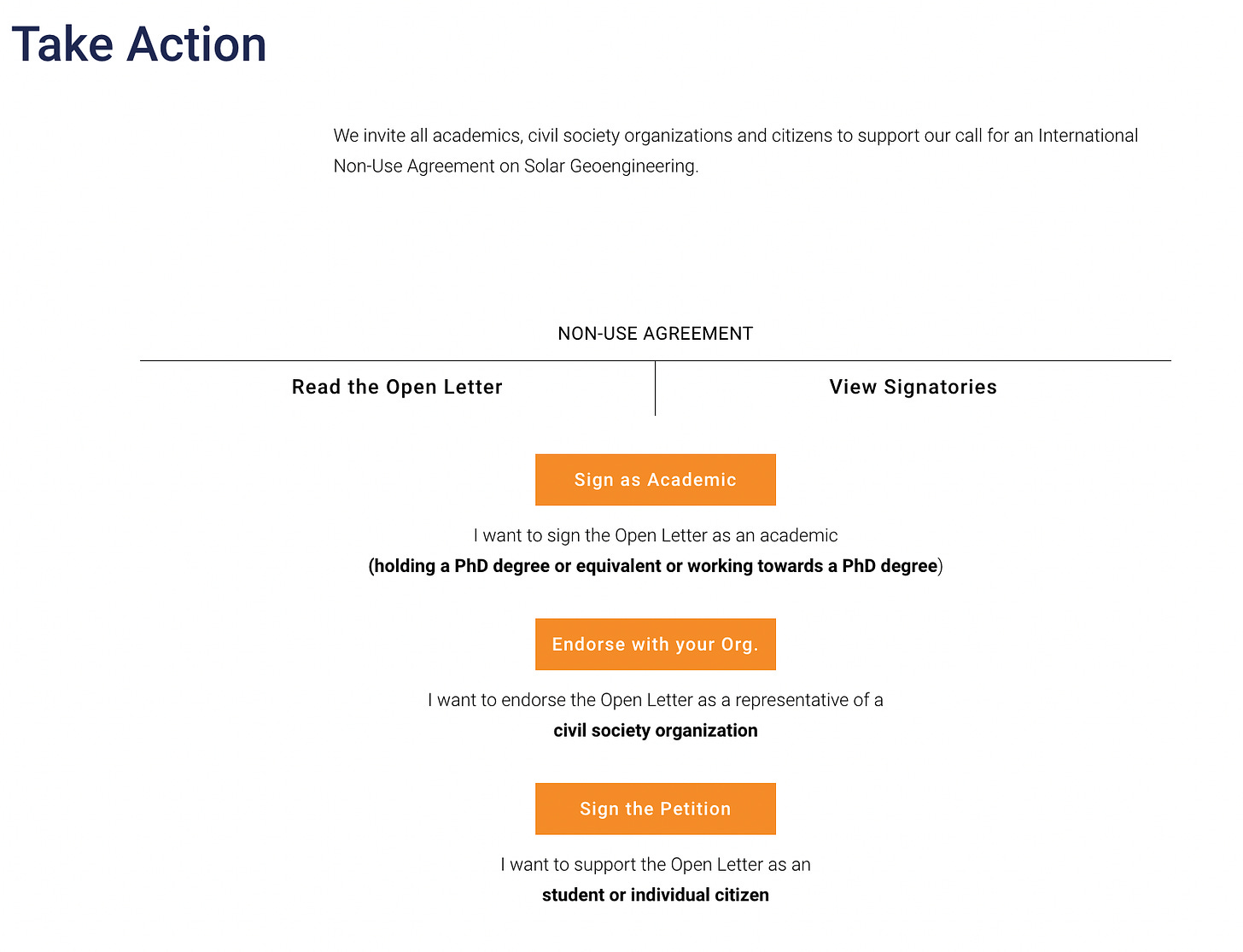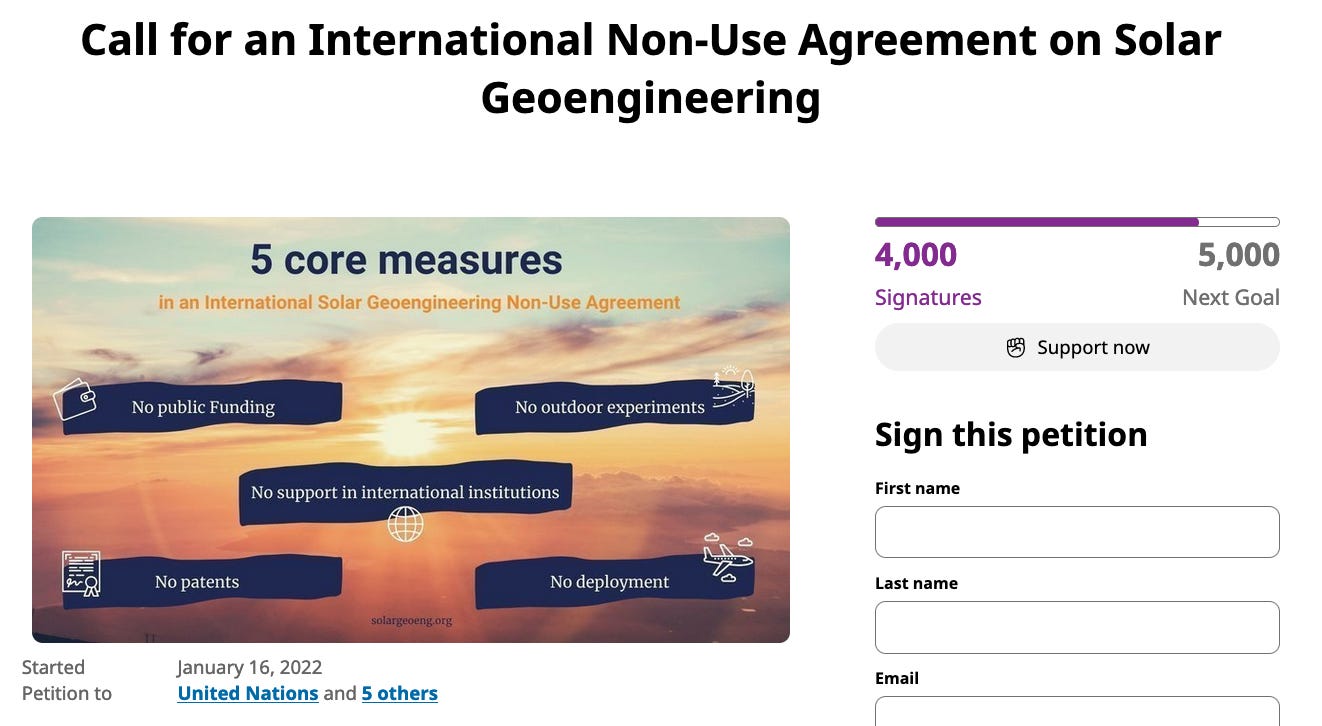The Simpsons: On Blocking the Sun
I Call This Enemy: The Sun" - AND Hundreds of Scientists Have Stood Up to Oppose Solar Geoengineering - AND So Can You!
Worldwide Scientists Who Signed an Open Letter Oppose Solar Geoengineering
These are the people you want to follow: those who put their names on letters, put themselves out on the tarp, lost their licenses, and otherwise stood up to be counted - no matter the consequences.
On January 17, 2022, over 60 academics wrote an open letter and published an article that was released in the WIREs (Wiley Interdisciplinary Reviews) Climate Change online publication. See their names and faces below, as they are Professors, Directors, Presidents, and most of all, staunch advocates who care about our world.
We call for immediate political action from governments, the United Nations, and other actors to prevent the normalization of solar geoengineering as a climate policy option. Governments and the United Nations must assert effective political control and restrict the development of solar geoengineering technologies at planetary scale. Specifically, we call for an International Non-Use Agreement on Solar Geoengineering.
Solar geoengineering⎯a set of hypothetical technologies to reduce incoming sunlight on earth⎯is gaining prominence in debates on climate policy. Several scientists have launched research projects on solar geoengineering, and some see it as a potential future policy option.
To us, these proliferating calls for solar geoengineering research and development are cause for alarm. We share three fundamental concerns:
First, the risks of solar geoengineering are poorly understood and can never be fully known. Impacts will vary across regions, and there are uncertainties about the effects on weather patterns, agriculture, and the provision of basic needs of food and water.
Second, speculative hopes about the future availability of solar geoengineering technologies threaten commitments to mitigation and can disincentivize governments, businesses, and societies to do their utmost to achieve decarbonization or carbon neutrality as soon as possible. The speculative possibility of future solar geoengineering risks becoming a powerful argument for industry lobbyists, climate denialists, and some governments to delay decarbonization policies.
Third, the current global governance system is unfit to develop and implement the far-reaching agreements needed to maintain fair, inclusive, and effective political control over solar geoengineering deployment. The United Nations General Assembly, the United Nations Environment Programme or the United Nations Framework Convention on Climate Change are all incapable of guaranteeing equitable and effective multilateral control over deployment of solar geoengineering technologies at planetary scale. The United Nations Security Council, dominated by only five countries with veto power, lacks the global legitimacy that would be required to effectively regulate solar geoengineering deployment.
These concerns also arise with informal governance arrangements such as multi-stakeholder dialogues or voluntary codes of conduct. Informal arrangements face barriers to entry by less powerful actors and risk contributing to premature legitimization of these speculative technologies. Science networks are dominated by a few industrialized countries, with less economically powerful countries having little or no direct control over them. Technocratic governance based on expert commissions cannot adjudicate complex global conflicts over values, risk allocation and differences in risk acceptance that arise within the context of solar geoengineering.
Without effective global and democratic controls, the geopolitics of possible unilateral deployment of solar geoengineering would be frightening and inequitable. Given the anticipated low monetary costs of some of these technologies, there is a risk that a few powerful countries would engage in solar geoengineering unilaterally or in small coalitions even when a majority of countries oppose such deployment.
In short, solar geoengineering deployment cannot be governed globally in a fair, inclusive, and effective manner. We therefore call for immediate political action from governments, the United Nations, and other actors to prevent the normalization of solar geoengineering as a climate policy option. Governments and the United Nations should take effective political control and restrict the development of solar geoengineering technologies before it is too late. We advocate for an International Non-Use Agreement on Solar Geoengineering specifically targeted against the development and deployment of such technologies at planetary scale.
The International Non-Use Agreement on Solar Geoengineering should commit governments to five core prohibitions and measures:
The commitment to prohibit their national funding agencies from supporting the development of technologies for solar geoengineering, domestically and through international institutions.
The commitment to ban outdoor experiments of solar geoengineering technologies in areas under their jurisdiction.
The commitment to not grant patent rights for technologies for solar geoengineering, including supporting technologies such as for the retrofitting of airplanes for aerosol injections.
The commitment to not deploy technologies for solar geoengineering if developed by third parties.
The commitment to object to future institutionalization of planetary solar geoengineering as a policy option in relevant international institutions, including assessments by the Intergovernmental Panel on Climate Change.
An International Non-Use Agreement on Solar Geoengineering would not prohibit atmospheric or climate research as such, and it would not place broad limitations on academic freedom. The agreement would instead focus solely on a specific set of measures targeted purely at restricting the development of solar geoengineering technologies under the jurisdiction of the parties to the agreement.
International political control over the development of contested, high-stakes technologies with planetary risks is not unprecedented. The international community has a rich history of international restrictions and moratoria over activities and technologies judged to be too dangerous or undesirable. This history demonstrates that international bans on the development of specific technologies do not limit legitimate research or stifle scientific innovation. In addition, an International Non-Use Agreement on Solar Geoengineering could include exceptions for less dangerous approaches, for example by allowing the use of localized surface albedo-related technologies that pose few cross-regional or global risks.
In sum, an International Non-Use Agreement on Solar Geoengineering would be timely, feasible, and effective. It would inhibit further normalization and development of a risky and poorly understood set of technologies that seek to intentionally manage incoming sunlight at planetary scale. And it would do so without restricting legitimate climate research. Decarbonization of our economies is feasible if the right steps are taken. Solar geoengineering is not necessary. Neither is it desirable, ethical, or politically governable in the current context.
Given the increasing normalization of solar geoengineering research, a strong political message to block these technologies is required. An International Non-Use Agreement on Solar Geoengineering is needed now.
Read the Extended Argument Here
Source:
You Can Sign Too
Source: https://www.solargeoeng.org/take-action/
It’s never too late to show support for NOT blocking the sun!
Sign as an Academic: https://www.solargeoeng.org/take-action/sign-the-open-letter/
Endorse with your Organization: https://www.solargeoeng.org/take-action/endorse-the-open-letter/
Sign as a Student or Individual Citizen (this is what I did). It takes you to a Citizen.Org Petition:
https://www.change.org/p/call-for-an-international-non-use-agreement-on-solar-geoengineering?utm_source=share_petition&utm_medium=custom_url&recruited_by_id=dcf58460-76a2-11ec-ad1b-b1cef621e6fc
The Petition:




























The more we mention geoengineering chemtrails the more they know we are well aware of what they do!!! This must cease asap !!
Discounting, for a moment, the cost of an integrated 'Sun-Blocking' system, there exists no universe in which multiple governments would or could agree on size, shape, scope or locations of
such a project.
When you ask people to 'Oppose Solar Geoengineering' it seems to be a moral, ethical and noble thing to do and has the added benefit of being part of a Feel Good Movement. However, when some of the most powerful and populated nations in the world can not agree on how and when to lower carbon emissions RIGHT NOW, there seems not even a remote possibility that your idea will be given a glance.
Rather than trying to oppose this idea, why not devise a workable solution to global warming that would integrate seamlessly with alternative energy sources already in place?